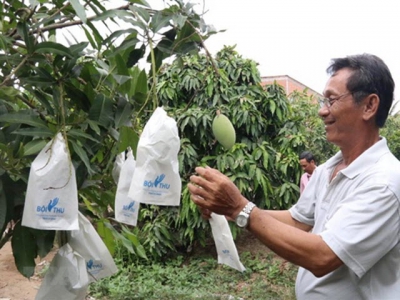Tiền Giangs Q1 fruit exports up 20.3%

TIỀN GIANG - The southern province of Tiền Giang exported 1,920 tonnes of fruit in the first quarter with US$3.9 million in turnover, a 20.3 per cent increase in value year-on-year.
Tiền Giang’s fruit export volume in the first quarter of the year were valued at 20.3 per cent higher than the same period last year. - VNA Photo Minh Trí
Aside from China, Tiền Giang’s raw and processed fruit products are also sold to markets such as Europe, the US, Japan and Korea.
Many challenges, however, face the province’s fruit industry, as the COVID-19 pandemic is hampering demand.
The provincial People’s Committee has instructed departments and districts to work with businesses on solutions to facilitate produce purchasing and exporting.
Businesses and organisations such as the Big C supermarket chain and Mỹ Tịnh An Commune dragon fruit co-operative group have taken part in the province’s programme to increase fruit purchases.
The province is focusing on hi-tech applications, smart agriculture, and improvement of its network of 130 agriculture co-operative groups to foster sustainable value chains.
Tiền Giang is a key agricultural production province in the Mekong Delta. It has over 79,000 hectares of land for growing numerous kinds of fruit, producing over 1.49 million tonnes of fruit annually.
Many of its fruits have received certificates of geographical indication and are favoured by domestic and foreign customers
Có thể bạn quan tâm
 Cooperative considered most effective way to boost income for millions of farmers: PM
Cooperative considered most effective way to boost income for millions of farmers: PM Collective economy is an inevitable trend during Vietnam’s efforts for global integration, Prime Minister Nguyen Xuan Phuc has said.
 Vietnam agro-forestry-fisheries exports record impressive growth
Vietnam agro-forestry-fisheries exports record impressive growth Digital transformation in agriculture is a great challenge, but if achieved, it will open up many opportunities for Vietnam's agricultural sector.
 Agriculture sector urged to earn $44 billion from exports next year
Agriculture sector urged to earn $44 billion from exports next year Prime Minister Nguyễn Xuân Phúc has asked the agriculture sector to strive to reach the target of US$44 billion in exports in 2021.
 Hanoi agricultural sector estimated to expand at record rate of 4.2% in 2020
Hanoi agricultural sector estimated to expand at record rate of 4.2% in 2020 For next year, Hanoi targets growth of the agricultural sector by at least 3%.
 Increase processing to increase the value of Vietnamese coffee beans
Increase processing to increase the value of Vietnamese coffee beans Under the commitments of the free trade agreements that Vietnam has signed, all member markets are open to Vietnam's roasted and deep-processed coffee